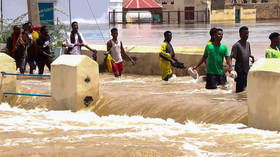State of emergency declared in tropical paradise

Seychelles President Wavel Ramkalawan has declared a state of emergency after a blast at an explosives depot and heavy flooding caused widespread devastation in the East African island country.
According to a statement published on the presidency’s website on Thursday, the explosion caused “massive damage” to the Providence Industrial Estate and surrounding areas on the Indian Ocean archipelago’s main island of Mahe.
The blast, which the BBC said occurred just after 02:00 local time, shook the island and also damaged the Seychelles international airport located about 2.5 miles (4 kilometers) away from the explosive depot.
However, a statement posted on the government’s official Visit Seychelles account on X (formerly Twitter) said the aviation hub “is still operational and ferry services between islands are operating for visitors.”
Heavy rains overnight have additionally triggered flooding and landslides, complicating emergency response efforts to both disasters, which President Ramkalawan has described as a “calamity” for the country.
The BBC reported that three people died when their homes were destroyed, while Reuters cited authorities as saying that at least two people were killed by the flooding.
“Everyone is being asked to stay at home. All schools will be closed. Only workers in the essential services and persons travelling will be allowed free movement,” the office of the president stated.
The measure is to “allow the emergency services to carry out essential work,” it added.
Flooding in the Seychelles, Africa’s least populous country with about 100,000 people, is the latest extreme weather event to strike East Africa. Heavy rains and flash floods blamed on the El Nino weather phenomenon have ravaged parts of the region since October, reportedly killing over 350 people and displacing over one million across Somalia, Kenya, Ethiopia, and Tanzania.
The Kenyan government reported late last month that severe flooding had killed at least 120 people and displaced nearly 90,000 families. Floods have also killed at least 96 people and displaced 700,000 in neighboring Somalia, according to officials.













